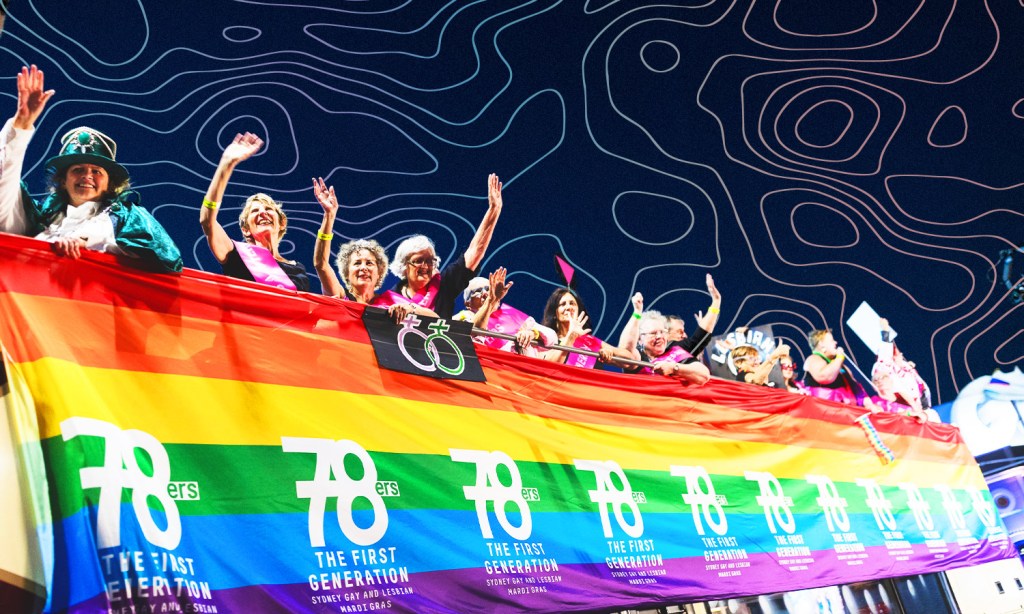Warning: This article deals with the topic of targeted violence against LGBTQIA+ folks and may be triggering for some readers. It also deals with the topic of domestic violence and could be triggering for some readers.
It’s WorldPride in Sydney. Not only is the city once again turning rainbow for the annual Mardi Gras Parade but the march itself has returned to its spiritual home of Oxford Street. And it’s not just Aussies getting in on the action. The eyes of Earth are upon us as we lay claim to being the first host in the Southern Hemisphere of the annual InterPride queer celebration.
2023 marks the 45th anniversary of the Mardi Gras Parade and, while it’s still an incredible celebration and testament to the achievements, power, and influence of queer culture, it’s also fundamentally a protest.
Now, with all the rainbow capitalism tie-ins and multicoloured products at the supermarket, you may not know it. But Mardi Gras, and pride, are all about striving for equality in the face of opposition and a refusal to live in fear or in hiding.
In 1978, the year the first Mardi Gras Parade walked down Oxford Street, homosexuality was illegal in NSW. Less than three decades prior, in Victoria, homosexuality was punishable by death. In fact, it was not made fully legal in Australia until 1997, when Tasmania finally decriminalised it. The age of consent for gay sex was also not equalised until 2016, when Queensland change its legistation.
As much as Australia likes to think of itself as a progressive, forward-thinking nation, it’s really only seen a shift in that direction over the span of roughly half a human lifetime. The divisive marriage equality plebiscite demonstrated just how deep-seated and prominent some of these regressive views still are. Hence the need to march.
So, where are we in 2023? With a shift in government last year to a decidedly more liberal leadership, the country may feel as though it’s becoming increasingly welcoming and accepting of the broad spectrum of queer identities. In a sense, it is. However, the longstanding clashes around trans rights and the continued legality of conversion ‘therapy’ in some states still indicate that we have a way to go.
Here’s what you need to know about the current state of queer rights in Australia.
Gay Rights in Australia
Rights for the LGBTQIA+ community in Australia have come a long way. In just the past few years, we’ve seen the passage of marriage equality, the repeal of forced divorce laws for trans people wishing to transition, and the scrapping of ‘gay panic’ defence in murder cases across Australia. In 2021, the 12-month celibacy requirements for men and gender non-conforming individuals who both have sex with men and wish to donate blood were slashed to three months.
Indeed, Australia is now widely considered to be one of the most accepting societies on the planet when it comes to queer people. We have a strong cultural history of stanning homegrown queer icons, like Kylie Minogue, while welcoming international stars like, Elton John, with open arms. The positivity, acceptance, and inclusion that the nation shows to queer people should be celebrated for the achievement that it is.
However, this is not to say that homophobia and discrimination, while mostly illegal, are not still major problems in this country. Nor should it excuse the fact that our legal system still does not fully protect all people across the gender and sexuality spectrum.
LGBTQIA+ human rights activist Rodney Croome has even written that “Sydney has by far the worst attitudes and laws on LGBTIQA+ equality of any Australian state or territory capital”.
He notes that the 2017 marriage equality plebiscite revealed that Sydney’s suburbs responded with the lowest ‘yes’ vote of anywhere in the country. Moreover, NSW has “Australia’s least effective laws against LGBTQIA+ discrimination” in that it still allows faith schools to expel queer students and fire queer teachers. Yup, there are no legal protections for discrimination towards bisexual, non-binary, or intersex people at all.
If the situation is still problematic in cities, it is decidedly worse outside of them. In the more regional areas of the country, homophobic views are likely to be more common. The plebiscite also revealed that rural areas of the country were far more likely to have majority ‘no’ views than metropolitan ones.
Croome is also right to point to education as one of the main pockets of society where homophobia is still allowed to lurk. A 2021 survey found that 90% of queer students in Australia have been subjected to homophobic language, while a third of them experience daily harassment. The survey also found that just 6% of gender and sexually diverse respondents said that teachers would intervene during harassment, while some reported that adults actively participated in it.
Of course, discrimination does not start and end in schools. Sport is another area in our society where discrimination is still blatantly apparent. Although sporting organisations are trying to use the games to teach equality to young people, a new study from Monash University has found that such training programmes have so far been broadly ineffective. In fact, young players were apparently more likely to use homophobic slurs after the training than before.
Attempts by large sporting organisations to increase diversity by hosting ‘Pride Rounds’ also appear ineffective. You only need to look at the lack of queer representation at the top level of sport in this country to see that queer or gender diverse people either do not feel safe to come out or are discouraged from participating along the way due to the present culture.
Finally, we have the religious and political elements, which, in Australia, often intertwine. Under Scott Morrison’s government, queer issues were frequently used to score cheap political points. Morrison personally refused to ban faith schools from expelling and firing queer students and teachers on the basis of their gender identity or sexuality. He also supported and endorsed Liberal candidates who had spread hateful messages about trans people. But, perhaps most grotesque, was Morrison’s multiple efforts to pass the Religious Discrimination Bill, something that was claimed to be used to protect people of faith from discrimination but, in actuality, would have more likely granted folks a licence to discriminate.
Having the government that sanctioned the above ideas voted from office is a good thing and a good sign for queer rights in this country. But is the current administration really any better?
The Labor government, during the election, promised to strengthen give LGBTQIA+ more healthcare support, and to set up a taskforce to end the HIV epidemic in Australia. They also said that they would adopt queer identity questions in the census and, crucially, bring in legislation that would protect the rights of queer people and students from being discriminated against in the school and workplace.
The policies, while better than the Coalition’s, were given a mixed review from Equality Australia which said that their anti-discrimination policies were lacking, as was their plan to combat conversion ‘therapy’, and domestic violence for queer people. Additionally, Labor had no policies to protect intersex people from harm.
In the October budget, Labor’s first in office, $1.3 million was earmarked over two years to support the health and wellbeing of LGBTQIA+ people. These included consultations to understand the barriers LGBTQIA+ people are up against when trying to access the healthcare system.
Additional funding was also provided to the charity QLife to recruit more volunteer support workers and 15 LGBTQIA+ specific workers to support domestic violence.
However, the budget did not include funding for LGBTQIA+ aged care, intersex public service funding, or gender-affirming care in the public service.
LGBTQIA+ Health congratulated Labor on the budget and said that it was “a step in the right direction” but said a lot more work needed to be done “to address the crisis in the mental health of LGBTQIA+ communities.”
What’s more, while Labor has yet to reform religious discrimination laws, steps have been made. Our Attorney General, Mark Dreyfus has commissioned a review into the country’s religious exemption rules for schools, the first formal step towards such reforms. That review is not due until April, with Labor unlikely to make any decisions on it until June.
So, progress does appear to be being made. Last week, Albanese confirmed he would become the first Prime Minister to march in the Mardi Gras Parade and, with Penny Wong as Foreign Minister, he has the first openly-gay woman in one of the top jobs in his cabinet.
“We speak a lot about tolerance – and tolerance is really important – but this is about a step that is way more important than tolerance,” Albanese said.
“We need to celebrate our diversity, not just tolerate it, because our diversity is what gives our society strength”.
Even Dominic Perrottet, the devout Catholic Premier of NSW, has considered it too divisive to stand firm on his initial ‘let’s think about it’ position on conversion ‘therapy’ — the bizarre religious idea that you can ‘convert’ people’s sexuality through brutal mental practices and prayer. He has, as of Friday, said that he would support a ban of the practice if re-elected.
It’s certainly progress. But until politicians no longer run ‘quietly’ on progressive queer policies, until trans and intersex people are protected to the same degree straight people are, and until the mental health crisis in the LGBTQIA+ community is given the funding and the support it deserves, we are still a long way from achieving the equality we so aspire to.
Still, we should celebrate how far we’ve come and enjoy WorldPride as the symbol it is for the Earth that we plan to create.
If this article brings up any issues for you or anyone you know, or you have experienced targeted violence, please contact Lifeline (13 11 14), Kids Helpline (1800 55 1800), both of which provide trained counsellors you can talk with 24/7. If you are in immediate danger, call 000.
If this article brings up any issues for you or anyone you know, or if you just feel like you need to speak to someone, please contact 1800 RESPECT (1800 737 732) — the National Sexual Assault, Domestic and Family Violence Counselling Service. If you are in immediate danger, call 000.
Related: All the Best Pride Events in Sydney at WorldPride 2023
Related: How Oxford Street Is Being Transformed for WorldPride 2023
Read more stories from The Latch and subscribe to our email newsletter.







